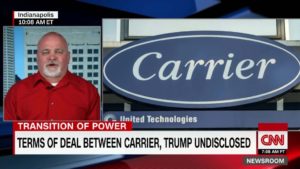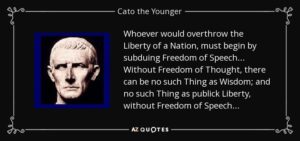 We need to get more sophisticated in our conversation on government regulation, or interference, in private business. Despite President Trump’s statements and possibly intentions to the contrary, we’re witnessing a massive increase in federal interference in civil society.
We need to get more sophisticated in our conversation on government regulation, or interference, in private business. Despite President Trump’s statements and possibly intentions to the contrary, we’re witnessing a massive increase in federal interference in civil society.
A simple way to understanding business-versus-regulation is this: Businesses usually resist the extra cost and hassle of governments making, changing, and then enforcing rules, some of which seem arbitrary, blunt, and excessive.
To an energy company owner facing the EPA, a financial services company facing the CFPB or SEC, or a pharmaceutical company facing the FDA, regulations will seem profit-reducing at best and business-destroying at worst.
And yet, as consumers, we typically don’t want energy waste dumped in our waterways, financial shysters running amok preying on the vulnerable, or untested drugs unleashed on the sick.
Reasonable people in a reasonable society can and should debate the right level of government interference with business.
Gary Dudley and Charlie Amato, for example, founded the San Antonio-based insurance giant SWBC forty years ago, and have seen a dramatic rise in the cost of compliance with federal regulations over that time.
Dudley told me recently “Everybody can agree we need to protect consumers from being taken advantage of. But the CFPB (The Dodd-Frank created Consumer Financial Protection Board) for example has a little too much power, in my mind. If you attack the financial institutions, you drive costs up, and consumers end up paying for that.”
In the past five years alone, Dudley says, ”The number of compliance officers on our payroll has increased by four times. A reduction in regulation,” Dudley continued “would go a long way toward helping businesses like ours employ more people and boost the economy.”
So, many people believe local, state, and federal regulation of businesses in the United States has gone too far as a rule. As a profit-seeking capitalist myself, I’m open to that idea.
President Donald Trump agrees with that idea as well, and I guess that’s why he promised to business leaders in January: “We think we can cut regulations by 75 percent. Maybe more.”
 Beyond the semantic question of what “75 percent” really means here, I think we have to reach for a deeper understanding of how government interacts with business to properly interpret Trump’s promise, tactical style, and effects.
Beyond the semantic question of what “75 percent” really means here, I think we have to reach for a deeper understanding of how government interacts with business to properly interpret Trump’s promise, tactical style, and effects.
I say that because there’s another consequence of regulation that should make everyone skeptical of government interactions with business. By this I mean a sort of libertarian view of the regulatory state. I’ve been reading my Plutarch recently, so I’ll call this the “Cato” view of government rules and regulation, named for the Roman Statesman who famously spoke out against the encroaching power of would-be dictators like Pompey and Caesar. The Cato view goes like this:
Every regulation acts as a bureaucratic bottleneck that a business must resolve via interactions with public officials. You don’t need to resort to outright bribes (although some will!) to understand the power that a public official wields at that bottleneck.
We’re talking about delays, paperwork, inspections, licensing, fees, fines, exceptions, certifications, committee hearings, and waivers. You get the idea.
In the Cato view, public officials empower themselves by exploiting those bottlenecks, to the detriment of everyone else in society. Businesses and consumers alike pay the costs, one way or another, of officials’  empowerment.
empowerment.
The Cato view, broadly understood, is what worries the heck out of me about President Trump’s approach to doing “deals” for business. He talks about “eliminating 75 percent of regulations,” but his core policies and style threaten to generate regulatory bottlenecks instead.
Restrictions on immigration, “America First” trade policy, carrots-and-sticks for on-shoring manufacturing, and Twitter-bullying of specific businesses all lead to bottlenecks that expand – rather than reduce – the power of public officials and the regulatory state.
Whatever your view of the Executive Order dubbed the “Muslim Ban,” there is no denying this creates an extraordinary bottleneck, in the Cato sense of the world. This bottleneck is why more than 100 tech CEOs filed a brief in the Ninth US Circuit Court of Appeals against the Executive Order. Tech CEOs understand the “Muslim Ban” hampers their ability to hire and attract the best talent in the world.
And they know, and we know, what would happen next, with this kind of ban, right? The Trump administration, in its eagerness to show it can do deals, would create special immigration waivers for those tech companies. Provided, of course, those companies “play ball” with the administration in other ways. Otherwise, they should expect delays and intransigence from federal regulators.
Whatever your view of Trump’s proposal for “America First” tariffs on goods coming from Mexico or China or other supposed trade rivals, there is no denying this border tariff creates extraordinary costs for importers. Can some group of importers cut a deal to get those costs reduced, because of a particular favored-company or favored-industry status? Do you have any doubt they will try? That’s what the corporate lobbying industry is built for!
A new set of import tariffs, as consistently promoted by the Trump administration, creates extraordinary opportunity for bottlenecks, and therefore, public-official empowerment through “deals” and “solutions.”
Whatever your view of the deal cut by Trump and then-Indiana Governor Mike Pence for the Carrier plant to maintain some manufacturing jobs in Indiana, there is no denying the message sent to other companies: If you want to get waivers, exceptions, or tax breaks, be sure to follow what the Trump administration would like you to do with respect to on-shoring, or domestic “job creation.” What manufacturing CEO would not try to get in line to curry favor with the Trump administration? Maybe they too can get a “deal” on some tax incentives? Right?
That deal may have given the appearance of “job creation” by government officials – who will certainly claim that success – but it also resembles an exploitable regulatory bottleneck, in the Cato view of the world.
When the Twitterer-in-Chief attacks a particular company like Ford or Nordstrom, it’s an extraordinarily blunt attack by the federal government against civil society.
Some of this is not particular to the current administration, but rather is inherent in government regulation. We’ve seen some of this before now. Some of it, however, is new, and forms the core the administration’s policies, tactics, and style. Regulation and interference come in a variety of forms, and we need to understand them as such.
Cato tried to warn the Roman Republic about the overreach of its leaders. Consider yourself warned about the Trump administration and its true approach to government interference in business.
A version of this ran in the San Antonio Express News and The Houston Chronicle.
Please see related posts
Book Review: The Fall of The Roman Republic by Plutarch
Post read (153) times.

